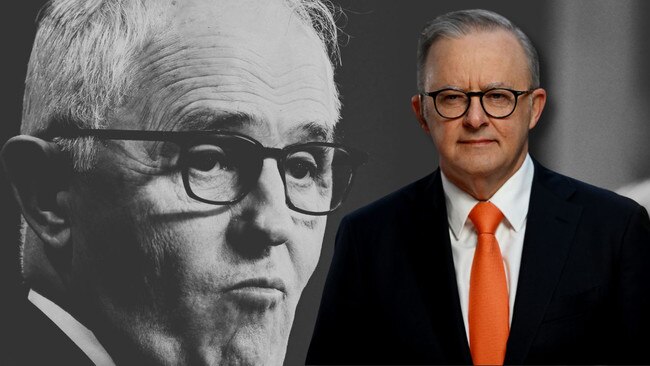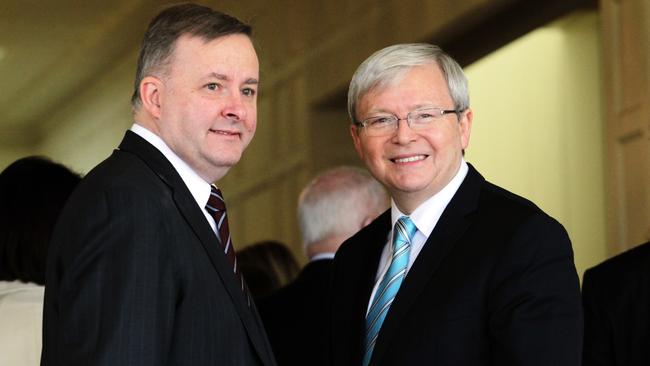Signs of desperation in Anthony Albanese’s Newspoll argument


But for some time Anthony Albanese has been keen to point to a positive benchmark in Newspoll history for his own record as he looks for a glint of gold in dross of long-running low primary vote which points the electoral finger at a lost majority at the next election.
Like all politicians who publicly say they don’t pay attention to the polls or commentary the Prime Minister is no different in that he can quote Newspoll numbers of years before without hesitation.
In the lead up to the second anniversary of his election Albanese cites the polling performance of first-term governments in the history of Newspoll claiming that he has achieved a first in not falling behind in the two-party preferred vote.
In spruiking the polling positives Albanese also makes the point that at no stage in the first two years after leading Labor to victory from Opposition has ever been behind Peter Dutton as preferred prime minister in Newspoll.
There’s no doubt Albanese is correct in relation to the Howard and Abbott governments, elected in 1996 and 2013 respectively, and is on track to match the Rudd Labor government of 2007.
But there are signs of political desperation in the argument which miss the point about Labor’s record low primary vote at the last election, that the Coalition primary vote shot ahead of the ALP’s after the referendum failure last year and that a lead in the two-party preferred vote doesn’t necessarily mean a majority government.
While Albanese makes it clear he is not complacent about the two-party preferred lead in the polls and is doing whatever he can in case there is an early election he needs to be careful of setting benchmarks of success or failure in Newspoll surveys.
There is no doubt that of the four first-term governments elected from opposition since the beginning of Newspoll that the Howard and Abbott Coalition governments quickly went behind in two-party preferred support after the election.
After a two-party preferred vote of 53.7 per cent to Labor’s 46.3 per cent at the 1996 election the Howard government’s first two years saw a reversal in primary vote and by late 1998 a reversal of the 2PP vote to 48.5 per cent to Labor’s 51.5 per cent.
As opposition leader, Howard overtook Paul Keating as preferred prime minister with a lead of 47 to 35 per cent at its best. Keating was back in front at the election he lost.
In 2013 Tony Abbott’s Coalition Opposition led the Gillard Labor government before the election 54 to 46 per cent on 2PP and won the election on 53.5 to 46.5 per cent.
But within three months the Coalition support fell to 48 to Labor’s 52 per cent, never recovered the lead and Malcolm Turnbull famously used “30 losing Newspolls in a row” to remove Abbott as a first-term prime minister.
Of course, this a problem with benchmarks — Turnbull, who almost lost the next election, was removed after he had fallen behind in “30 Newspolls in a row”.
So far, Albanese hasn’t beaten Kevin Rudd’s performance in Newspoll because when elected in 2007 on a 2PP of 52.7 per cent to 47.3 Rudd went on to build on Labor’s vote — 63 to 37 per cent at one stage — an only fell behind the Coalition in April 2010 49 to 51 per cent. Rudd was never behind on preferred PM to Brendan Nelson, Malcolm Turnbull or Abbott when he was removed in June 2010.
It is here that Albanese needs to be careful when urging people to check the Newspoll record because compared to Rudd’s his first to years is not as impressive.
On the two-party preferred vote Labor has not been behind the Peter Dutton-led Coalition but there was a 50-50 draw in November last year after the catastrophe for Albanese of the lost referendum on the indigenous voice to parliament and although the ALP has been in front since and it has remained close.

Even after a budget with “tax cuts for all” and $300 energy rebate Labor’s lead was 52 to 48 per cent, a mere one-point lift well within the margin of error.
Albanese has had better two-party preferred results in his first two years than both Howard and Abbott but not as good as Rudd’s and there is a danger any benchmark set, such as Turnbull’s, turns into a curse if not met.
On preferred prime minister Howard fell behind Kim Beazley within the two years after announcing his intention to introduce a GST and was neck and neck at the 1998 election.
Abbott was in front of Rudd before the 2010 election.
Albanese’s lead over Dutton as preferred prime minister suffered a blow after the referendum but has remained ten or more points ahead and last weekend was 52 to Dutton’s 33 per cent.
But, as Albanese knows, a good number or two in Newspoll doesn’t mean survival and there’s a danger in setting benchmarks which can come back to haunt as a miserable ghost (just ask Turnbull).
Governments can hold one with less than 50 per cent of the two-party preferred vote (just ask Howard), Government’s can go into minority with more than 50 per cent (just ask Gillard), Opposition leaders can be elected with losing preferred PM vote (just ask Abbott) and PMs can be removed with a positive 2PP (just ask Rudd).
Albanese’s first two years may be ahead of Howard and Abbott on some measures and on track to better Rudd’s as a first-term prime minister but its best for leaders to concentrate on what they doing for the future than dwell on anniversaries and historic polling.



As the Albanese Labor government celebrates its second anniversary and enters its third and election year there is a surrounding sea of adversity, a heritage of failure and a disappointing public reaction in the latest Newspoll to a big-spending budget designed to ease the cost-of-living crisis.